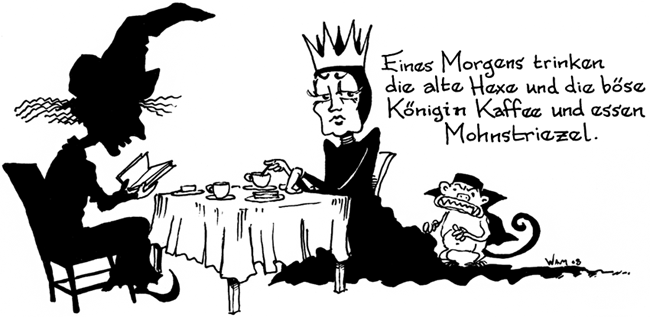10.6.1.7: Narration/Erzählung
- Page ID
- 108512
Adverbs:Das Adverb - Narration
Adverbs provide information about how, where, when, to what degree, or how often an action takes place. They modify verbs or adjectives or other adverbs. They are also used to connect thoughts (and sentences) to form longer narratives, such as establishing a chronological sequence or cause-and-effect relationships. Keep in mind that the verb comes immediately after a sentence-initial adverb of time – and that, unlike in English, is NOT separated by a comma!
| Eines Morgens trinken die alte Hexe und die böse Königin Kaffee und essen Mohnstriezel. Auf einmal sagt die alte Hexe: "Ich habe neulich im Internet gesurft und habe ein Bild von unserem Schloss gesehen. Wusstest du, dass es hier eine Folterkammer gibt? Mit einem Skelett?" | One morning the old witch and the evil queen are drinking coffee and eating a poppy seed pastry. Suddenly, the old witch says: the other day I was surfing in the Internet and saw a picture of our castle. Did you know there is a torture chamber here? With a skeleton? |

For chronological accuracy, German relies more heavily on adverbs than on verb tenses. People in Germany will be quite confused if you misuse adverbs. Using adverbs accurately is an important step toward being able to communicate effectively in German.
1. To begin with ...
| (zu)erst | => | at first | damals | => | back then | |
| anfangs | => | in the beginning | einmal | => | one time | |
| am Anfang | => | in the beginning | neulich | => | the other day | |
| eines Morgens | => | one morning | eines Tages | => | one day | |
| eines Abends | => | one evening | früher | => | back in the day |
| die böse Königin | Tja, es ist mir zu Ohren gekommen, am Anfang waren nur wir, die Märchenfiguren, im Schloss. Aber eines Tages hat der Karikaturist eine Folterkammer und ein Skelett gezeichnet, was unsere Autoren ganz lustig gefunden haben! Tja, über Geschmack lässt sich nicht streiten. | Well, as I heard it through the grapevine, at first, we - the fairy tale characters - were the only ones in this castle, but one day the cartoonist drew a torture chamber and a skeleton, which our authors found really funny! There is no accounting for taste. |
2. Action in the middle
| dann | => | then | mittlerweile | => | meanwhile |
| zunächst | => | next, then | als nächstes | => | then |
| danach | => | afterwards | bald/kurz darauf | => | soon/shortly (thereafter) |
| anschließend | => | afterwards | daraufhin | => | as a result |
| auf einmal | => | suddenly | plötzlich | => | suddenly |
| nachher | => | afterwards | später | => | later on |
| vorher | => | beforehand | da | => | at that moment |
| bis dahin | => | up until then | immer noch | => | still |
| inzwischen | => | in the meantime | unterdessen | => | meanwhile |
| jetzt | => | now |

| die alte Hexe | Auf einmal taucht ein Skelett in unserem Schloss auf und niemand informiert uns? | Suddenly a skeleton appears in our castle and nobody informs us? |
| die böse Königin | Siehst du, so ist das. Danach mussten unsere Autoren seine Anwesenheit natürlich erklären, und für ihn eine Lebensgeschichte erfinden. Das haben sie mittlerweile gemacht, und jetzt werden wir beide dafür ausgenutzt, diesen Charakter darzustellen. | See how it is here? Then, of course, our authors had to explain his presence and come up with a life story for him. They've done that in the meantime, and now we are both being exploited to present this dude. |
3. Concluding adverbs
| schließlich | => | eventually, in the end | zuletzt | => | at last, last | |
| zum Schluss | => | in the end | seitdem | => | since then | |
| am Ende | => | at the end |
| die alte Hexe | Naja, was können wir tun? Schließlich müssen wir machen, was sie uns vorschreiben. | Oh well, what can we do? In the end, we have to do what they dictate us to do. |
Adverbs as conjunctions
Apart from these time-markers, you can also use adverbs to connect sentences: either similarly to coordinating and subordinating conjunctions or just thematically across sentence boundaries (in narration, for example).
1. Additional information
| außerdem | => | besides, moreover, what's more |
2. Explanation
| deswegen | => | that's why | aus diesem Grund | => | therefore | |
| darum | => | therefore | deshalb | => | therefore, thus | |
| daher | => | therefore | eigentlich | => | actually, for all intents and purposes |
3. Contrast
| dennoch | => | nevertheless | stattdessen | => | instead of that | |
| trotzdem | => | in spite of that |
| die alte Hexe | Na und? Wer war er denn? | So? Who was he then? |
| die böse Königin | Aha, laut der Geschichte war er ein revolutionärer Dichter in Ostberlin in den 60er Jahren. Aus diesem Grund wurde er von der Staatspolizei verfolgt. Er hätte eigentlich ins Exil gehen können, aber er wollte lieber in Deutschland bleiben. Später wurde er verhaftet und hier eingesperrt. Außerdem - was unseren Autoren ganz gelegen kam - hat man ihn nach der Wende völlig vergessen, und so ist es dann passiert, dass er jetzt in unserer Folterkammer einfach - sozusagen - herumgammelt! Ahha, ich bin so geistreich! | Aha, according to the story, he was a revolutionary poet in East Berlin in the 60s. Because of this he was pursued by the State police. He actually could have gone into exile, but he wanted to stay in Germany. Later he was arrested and locked up here. What's more - and this is quite convenient for our authors - they just forgot about him after the system change, and so it happened that he is now - so to say - hanging around in our torture chamber! Ah, I am so witty! |


